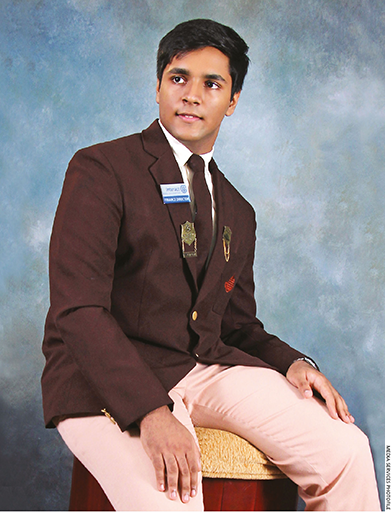YOUTH FORUM
Compiled by Savithri Rodrigo
TIME TO SAVE THE PLANET
Raj Prabu Rajakulendran says education is the key to curb climate change
Q: What is the good, the bad and the ugly in Sri Lanka?
A: The ‘good’ is Sri Lanka’s natural beauty – from our mountains to rivers, waterfalls and beaches. Sri Lanka has it all and this is our nation’s greatest asset.
The ‘bad’ is the destruction of nature under the guise of development, which must be stopped immediately and properly analysed prior to projects being finalised.
And the ‘ugly’ is the increase in crime, resulting in the country surrendering its peace and harmony.
Q: What are the challenges facing the nation today?
A: The main challenge is poverty. Although we have seen some improvement in recent years, it remains embedded as a pressing reality in the island.
Solving this is a challenge because successive governments have lacked the initiative to improve living conditions of the poor. Existing benefits are not communicated properly to intended recipients, which has a cascading impact and doesn’t solve the larger problem of poverty.
Q: How can Sri Lanka retain the talent that it has?
A: The root cause of this is not merely attractive prospects overseas but also frustration at difficulties encountered locally. Whether it’s in addressing the most minor matter or a lack of teamwork and readiness to adapt to change in institutions – and ultimately, for the country – the bigger picture isn’t considered.
To avoid this, major changes are required in Sri Lanka’s administrative procedures, and the nation’s mindset must be changed to enable citizens to learn to embrace and encourage change.
 Q: Where do you see yourself in 10 years’ time?
Q: Where do you see yourself in 10 years’ time?
A: In the seat of a CFO of a prestigious corporate in Sri Lanka.
Q: And where do you see Sri Lanka in a decade from now?
A: I see the future of my nation as a service hub, and with major development projects such as the Western Region Megapolis having taken root. And I foresee many more major investments being infused especially in the areas of finance, logistics, industry, IT and entertainment.
Q: What are your expectations of the world and its people?
A: I expect people to know their rights and responsibilities. They must respect others as well as the environment. And they should contribute to society, their community and country positively. People must help each other, thereby making society a better place for others to live and thrive.
My expectations are that people must cherish values, principles and ethics – and be custodians of peace and harmony. This will ensure that these tenets are top of the mind in whatever they do and say.
Q: Who is responsible for climate change or global warming and what must now be done about it?
A: It is primarily the education system that’s responsible. While every school’s curriculum does teach us about global warming, its gravity and the challenges that will ultimately be faced by the world – and especially younger generations – aren’t fully covered. The dire circumstances are not explained to the fullest.
The disastrous consequences must be drilled into everyone’s minds regardless of which country they live in; it is only then that the realisation will dawn about the impact they too face in an immediate sense.
I believe in the nudge theory, which is to provide information and make people realise how bad the situation is. It must never be sugarcoated. They’ll then become more cautious about the impacts of their actions and how they too contribute to global warming.
Q: How do you view the growing importance of social media today?
A: Social media has taken a major leap in recent years; it is omnipresent no matter where we live. Every age group is involved in social media and one cannot find a teenager who isn’t connected to some form of it.
The fast-paced growth and importance of social media will have to be accepted by everyone, and people must learn to adapt to the changes it brings. Social media has opened avenues to stay connected and be fully aware of what’s happening around the world no matter how remote a country’s location is.
However, there is misuse of social media with unethical practices, rumours, and other forms of exploitation and misapplication of this valuable tool.
If these loose nuts are tightened especially from a security angle, the benefits of social media would be limitless.







Leave a comment